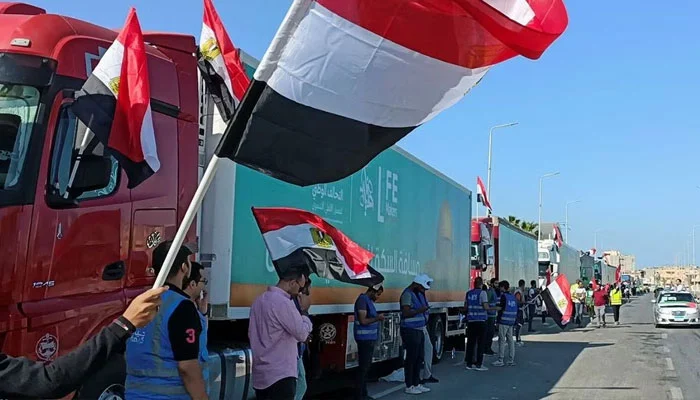In a significant move aimed at alleviating the dire humanitarian situation in the Gaza Strip, Israel announced on Wednesday that it would allow the delivery of essential aid to the region through Egypt. This decision comes in response to a request from US President Joe Biden, as confirmed by Prime Minister Benjamin Netanyahu’s office. However, Israel’s approval for the aid comes with certain conditions.
The humanitarian aid, which primarily includes “food, water, and medicine,” is desperately needed in Gaza, which has been grappling with severe shortages of essential supplies due to an Israeli-led blockade that has been in place since 2007.
Israel’s willingness to permit aid deliveries through Egypt demonstrates a step towards addressing the ongoing humanitarian crisis in the region, but it comes with significant stipulations. Israel has emphasized that the aid must not reach Hamas, the governing authority in Gaza, a group it deems as a terrorist organization.
Furthermore, Israel has maintained that it will not directly provide the aid from its own territory until Hamas releases dozens of hostages taken during a major attack on October 7. This attack marked the onset of a full-scale conflict between Israeli forces and Palestinian militants in Gaza.
The Israeli statement underlined the demand for Red Cross visits with the captives and sought broad international support for this requirement. These conditions reflect Israel’s stance on the need for accountability and a safeguard against any aid being diverted for military purposes.
The situation in Gaza has significantly deteriorated since the outbreak of hostilities, and the recent move to permit humanitarian aid comes amidst escalating tensions and violence. Israel has responded to attacks from Gaza with military actions, resulting in a devastating toll on both sides.
It is estimated that approximately 1,400 Israelis and 3,500 Palestinians have lost their lives in the ongoing conflict, with thousands more injured.
This announcement coincided with President Biden’s recent visit to Israel, during which he reaffirmed US support for the country. President Biden also endorsed Israel’s assertion that Palestinian militants were responsible for a deadly rocket strike on a Gaza hospital, further contributing to the ongoing tensions in the region.
Additionally, the United States exercised its veto power at the United Nations Security Council, blocking a resolution put forward by Brazil. This resolution called for humanitarian pauses in the ongoing conflict between Israel and Palestinian Hamas militants, with the aim of facilitating the delivery of much-needed humanitarian aid to the Gaza Strip.
The vote on the resolution had been postponed twice as the US worked to negotiate aid access to Gaza, underscoring the importance of diplomacy in the region. In the final vote, twelve member states supported the Brazilian-drafted resolution, while Russia and Britain abstained.
US Ambassador to the United Nations, Linda Thomas-Greenfield, defended the decision to veto the resolution. She stated, “We are on the ground doing the hard work of diplomacy. We believe we need to let that diplomacy play out. Yes, resolutions are important. And yes, this council must speak out. But the actions we take must be informed by the facts on the ground and support direct diplomacy efforts. That can save lives. The council needs to get this right.”
The complex and challenging situation in the region underscores the pressing need for humanitarian aid to reach Gaza’s vulnerable population. However, the conditions and restrictions placed on aid deliveries, along with ongoing diplomatic efforts, reflect the intricate web of international relations and security concerns surrounding the Israeli-Palestinian conflict.















